The Cowles 2024 Summer Conferences Welcome Over 350 Economists to Yale
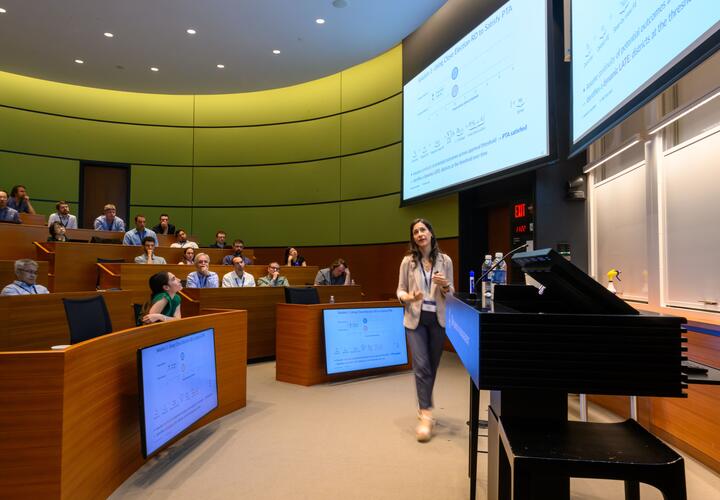
Above: Barbara Biasi (Yale SOM) presented 'What Works and For Whom? Effectiveness and Efficiency of School Capital Investments Across The U.S.' at the Labor & Public Economics Conference.
Each summer the Cowles Foundation brings together leading economists from around the world to push the frontiers of research in many key fields of economics. The 2024 Summer Conferences welcomed over 350 economists to Yale’s campus to take part in lively discussion of over 60 new and ongoing research papers.
The week-long event advances the Cowles Foundation’s goal of developing and applying rigorous logical, mathematical, and statistical methods of analysis in economics in the areas of international trade, economic theory, labor & public economics, econometrics, industrial organization, and macroeconomics. This year, faculty from inside and outside Yale organized six individual 1-2 day conferences, each with its own theme and roster of top academics in the field. The 60+ presentations led to many discussions and debates that help shape ongoing research and give rise to new work. Below we highlight photos and brief summaries from each of the conferences.

What’s special about the Summer Conferences is how they tap experts from diverse fields for an intense week engaging with new research. All of us at Cowles are proud to see the conferences flourish, with continued enthusiasm from participants. This year featured exciting work on a wide range of topics such as exploring issues in trade and the environment, applying machine learning and AI tools to research, examining the inner workings of labor markets, and using novel datasets to measure and predict important features of the macroeconomy.
— Samuel Kortum, Cowles Foundation Director
Jump to:
June 3: Conference on International Trade
The 2024 International Trade Conference, organized by Samuel Kortum (Yale), Giovanni Maggi (Yale), and Joseph Shapiro (UC Berkeley), brought together over 50 participants to hear and discuss 7 papers, with a particular focus on environmental issues.
Karthik A. Sastry (Princeton) opened the conference with ‘Food Policy in a Warming World,’ asking whether governments systematically intervene in agricultural markets in response to climate shocks. And what are the aggregate and distributional consequences? Farid Farrokhi (Purdue University) followed with a study of deforestation in a dynamic world trade system. He and coauthors built a model in which structural change and comparative advantage determine the extent, location, and timing of deforestation.
Other topics included the impact of agricultural and trade policies on regional water scarcity, the environmental and economic effects of China’s ban on plastic waste imports, the welfare impacts of solar panel tariffs, and more.
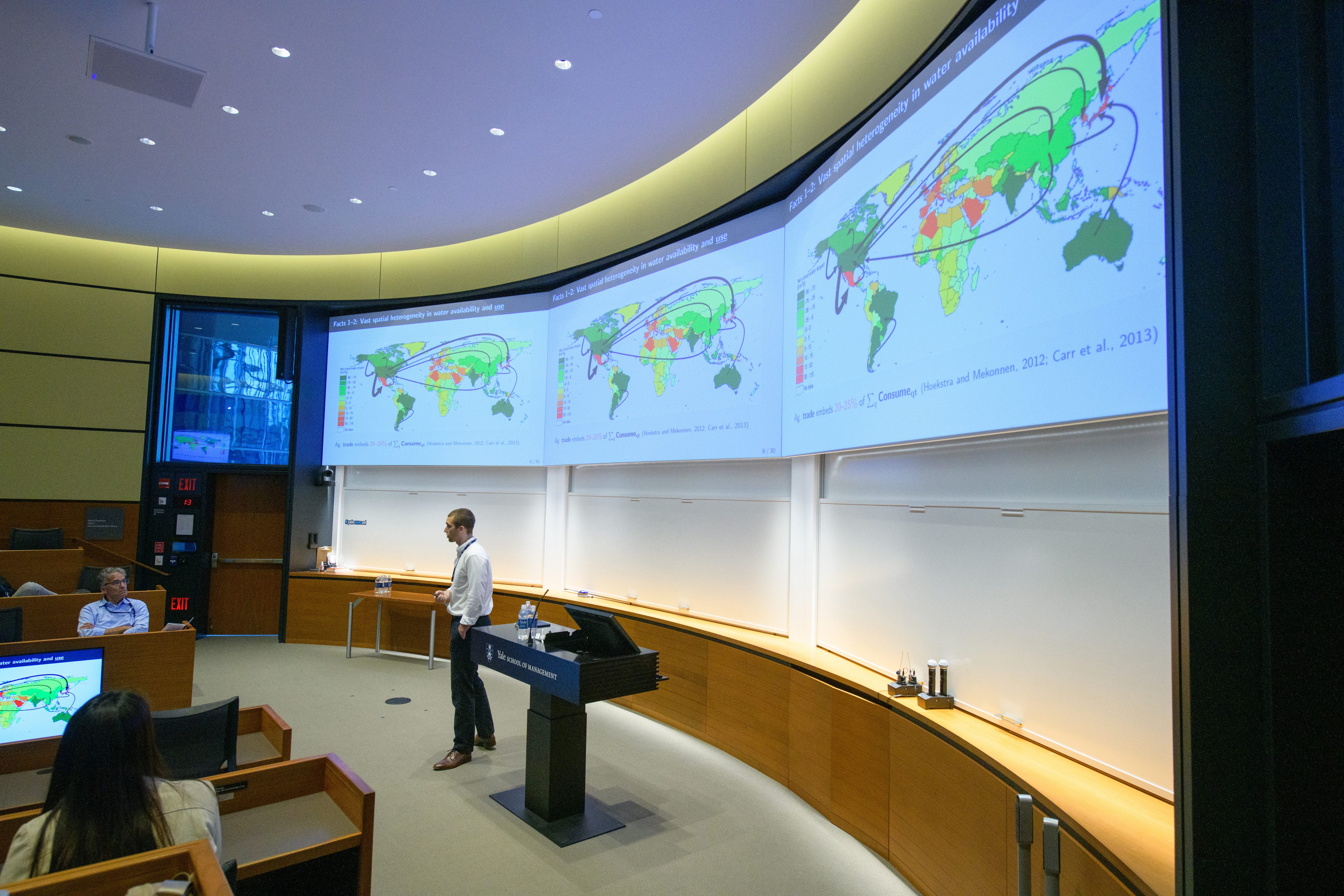
We were delighted to see so much interest and good research on trade and the environment. The papers brought a global perspective to topics such as plastic waste, electric vehicles, and water.
— Samuel Kortum, Giovanni Maggi, and Joseph Shapiro, organizers
The full conference agenda and list of papers is available here. Learn more about the Cowles International Trade Research Program here.
June 3-4: Conference on Economic Theory
Philipp Strack (Yale), winner of the 2024 John Bates Clark Medal, organized the Economic Theory Conference, which featured 12 papers and over 90 participants.
Day one featured work on incentives for informed voting, narrow framing in games, multidimensional screening, and more. Ben Golub (Northwestern University) presented ‘Incentive Design With Spillovers,’ which explores performance incentives that depend on jointly achieved outcomes. For example, how should such incentive schemes be designed, and how should they take into account the structure of production on the team? Rohit Lamba (NYU Abu Dhabi and Cornell University) presented ‘Hard information design,’ which looks at the Pareto efficient certifications for transactions that rely on hard (or verifiable) information about the underlying value of the intended exchange (e.g., housing, diamonds, and bonds).
Day two included many in-progress studies, including work on solving rational inattention problems, issue selection in constrained communication, aggregating strategic information, and optimal in-kind redistribution, as well as a few published studies. Shengwu Li (Harvard University) presented work with Shani Cohen, ‘Sequential Cursed Equilibrium,’ which uses game theory to explore players that neglect information from hypothetical events, but make inferences from observed events. Drew Fudenberg (MIT) presented ‘Endogenous Attention and the Spread of False News,’ which looks at misinformation on social media and the mechanisms by which it spreads.
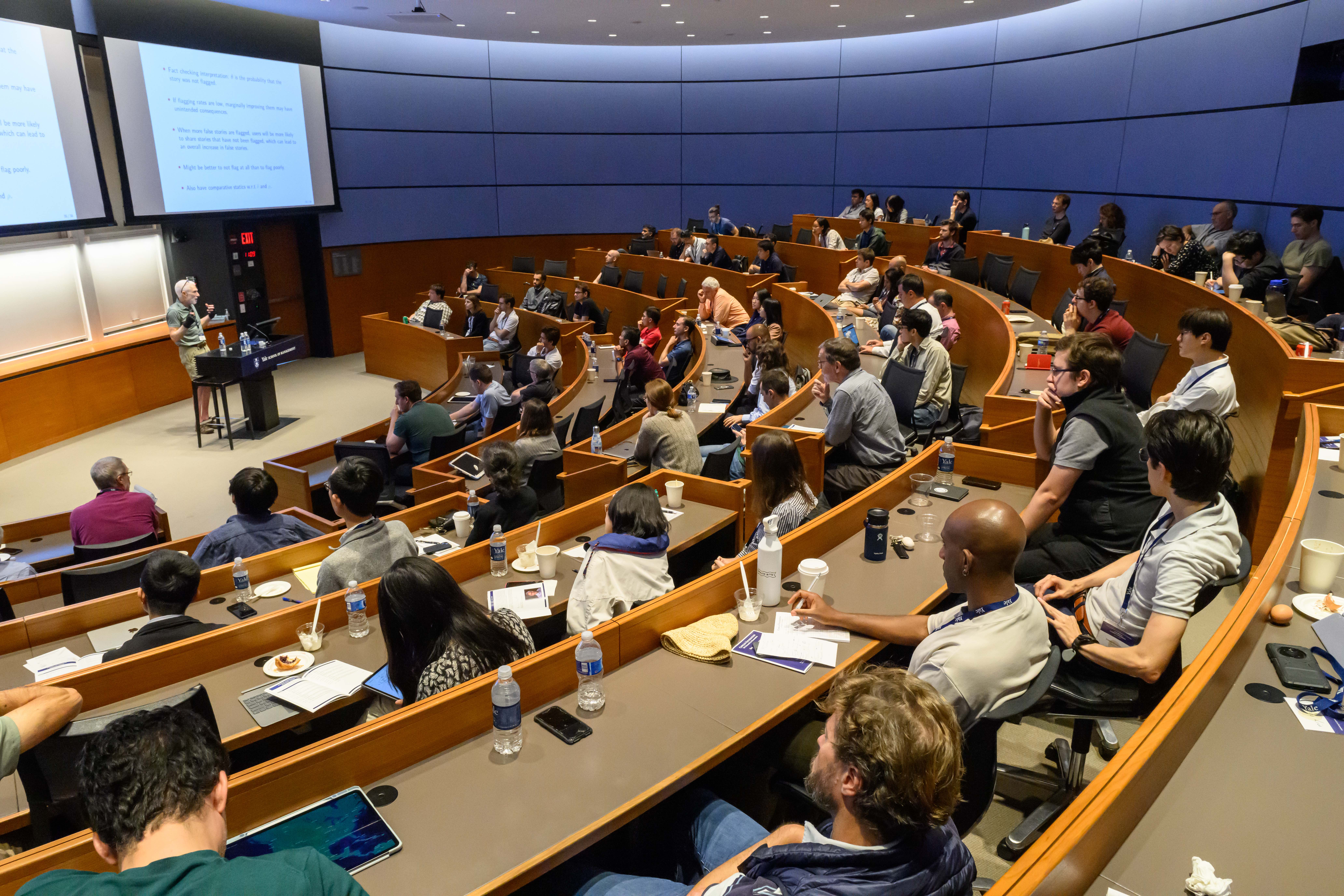
The Economic Theory Conference was great because of the active friendly discussions and collegial atmosphere. Thank you to all participants!
— Philipp Strack, organizer
The full conference agenda and list of papers is available here. Learn more about the Cowles Economic Theory Research Program here.
June 3-4: Conference on Labor & Public Economics
Winnie van Dijk (Yale) and Seth Zimmerman (Yale) organized this year’s Labor and Public Economics conference, featuring over 80 participants and 22 papers, including 6 job-market papers.
Yotam Shem-Tov (University of California, Los Angeles) opened this year’s conference by asking: ‘How Replaceable is a Low-Wage Job?’ His paper with Evan K. Rose (University of Chicago) explores the long-run consequences of losing a low-wage job, including effects on employment, hours, and wage rates. Day one also featured work by Yale’s Barbara Biasi which identifies which investments in school facilities help students and are valued by homeowners: ‘What Works and For Whom? Effectiveness and Efficiency of School Capital Investments Across The U.S.’
Day two featured work on economic mobility, longevity, wage insurance, and more, and included Hanming Fang (University of Pennsylvania) and coauthors’ work on ‘Labor Unions and Social Insurance.’ Their paper examines the equilibrium impacts of labor unions on labor market outcomes, as well as the forces underlying the dramatic decline in the unionization rate in the United States in the past half-century. Benjamin Hyman (Federal Reserve Bank of New York) presented work that estimates the causal effects of wage insurance on displaced workers’ employment and earnings in the U.S. using linked administrative data and a regression discontinuity design.
Each day featured three job market presentations, including work by Angela Crema (New York University; [paper]), Martín García-Vázquez (University of Minnesota; [paper]), Karl Schulze (Princeton University; [paper]), Benjamin Goldman (Harvard University; [paper]), Romaine A. Campbell (Harvard University; [paper]), and Felipe Lobel (Columbia University; [paper])
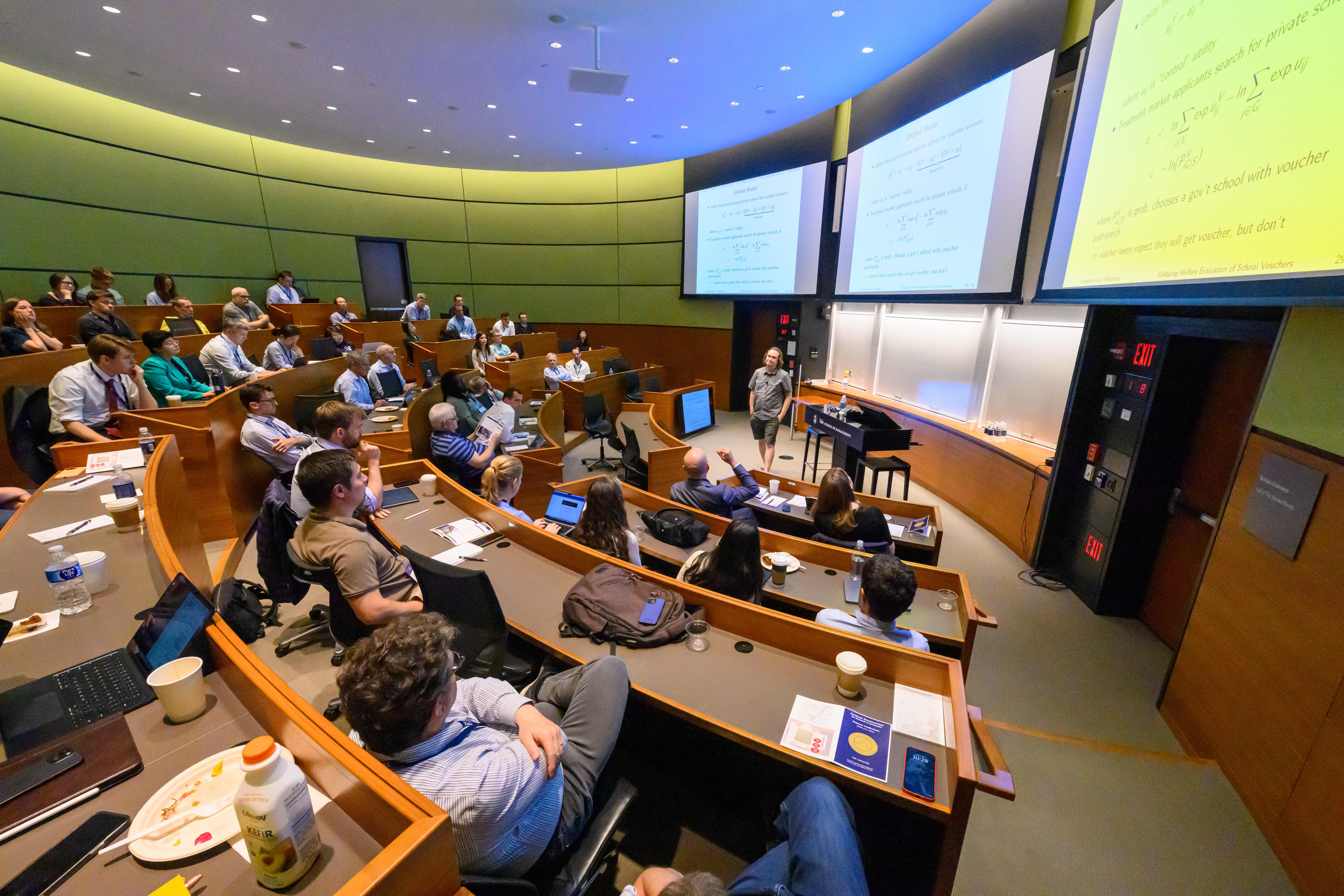
This year's Cowles Conference in Labor and Public Economics showcased frontier research on inequalities in intergenerational mobility, wealth accumulation, and public expenditures, alongside investigations of the inner workings of labor markets and rigorous assessments of various public policies' welfare implications. From analyzing the effects of expanded childcare programs to evaluating the distributional effects of energy crises, the conference highlighted the diverse approaches economists are using to understand and address pressing societal challenges.
— Winnie van Dijk and Seth Zimmerman, organizers
The full conference agenda and list of papers is available here. Learn more about the Cowles Labor & Public Economics Research Program here.
June 5-6: Conference on Econometrics
The 2024 Econometrics Conference, organized by Bryan Graham (Berkeley) and Yuichi Kitamura (Yale), brought together over 50 participants to learn about 14 papers on a broad range of trade topics, with a particular focus on ‘networks.’
The theme of the 2024 Cowles Conference in Econometrics was "networks." Networks are pervasive in economics—supply chains, lender-borrow relationships, and scientific collaborations all define networks. Analyzing such data involves a number of modeling and technical challenges. This is a new area in econometrics, but the presentations this summer were nevertheless remarkably cohesive, interconnected, and suggestive of the emergence of a real scholarly discourse in this area. It was valuable to meet and engage with each other. It was also a tremendous amount of fun. Thanks as well to the outstanding Cowles staff (and other Yale employees) who worked so hard to make the event run seamlessly.
— Bryan Graham and Yuichi Kitamura, organizers
Selected presenters and papers on networks included:
- ‘Top-Down Recursive Spectral Clustering For Heterogeneous and Multiscale Networks’ Presented by Lihua Lei (Stanford University)
- ‘A Strategic Model of Software Dependency Networks’ Presented by Angelo Mele (Johns Hopkins University)
- ‘Causal Clustering: Design of Cluster Experiments under Network Interference’ Presented by Davide Viviano (Harvard University)
- ‘Causal Interpretation of Estimands Defined by Exposure Mappings’ Presented by Michael Leung (University of California, Santa Cruz)
The full conference agenda and list of papers is available here. Learn more about the Cowles Econometrics Research Program here.
June 5-6: Conference on Models & Measurement
Katja Seim (Yale), Nick Ryan (Yale), and Patrick Bayer (Duke University) organized the 2024 Models & Measurement conference, which welcomed over 100 participants and 10 papers.
Models and Measurement uses economics to answer practical questions about every market under the sun. How do we help kids find the best school? How can we keep airlines from monopolizing an airport and jacking up prices? Is there anything that can be done to save local news? Recent research at the conference addressed these questions and many more.
— Katja Seim, Nick Ryan, and Patrick Bayer, organizers
The 2024 conference featured new research on firms' price coordination in markets ranging from news [paper] and procurement contracting [paper] to multifamily rental markets [paper]. From a methodological perspective, papers addressed how to identify consumer preferences, firm cost structures, and the strength of competitive interactions while limiting the role of model misspecification, given frictions such as consumers' imperfect knowledge of available choices and selection in product availability.
Several papers examined education markets. Minseon Park (Yale University) presented ‘A Dynamic Framework of School Choice: Effects of Middle Schools on High School Choice,’ which studies the dynamic relationship of school choices across different educational stages. Using quasi-random middle school assignments in New York City, the authors show that middle schools with top quality-review scores cause students to be matched to higher-achievement high schools, in both level and value-added. Claudia Allende (Stanford) presented work recently released as an NBER working paper titled ‘Search and Biased Beliefs in Education Markets,’ coauthored with Patrick Agte (Yale), Christopher Neilson (Yale), Adam Kapor (Princeton University), and Fernando Ochoa (New York University).
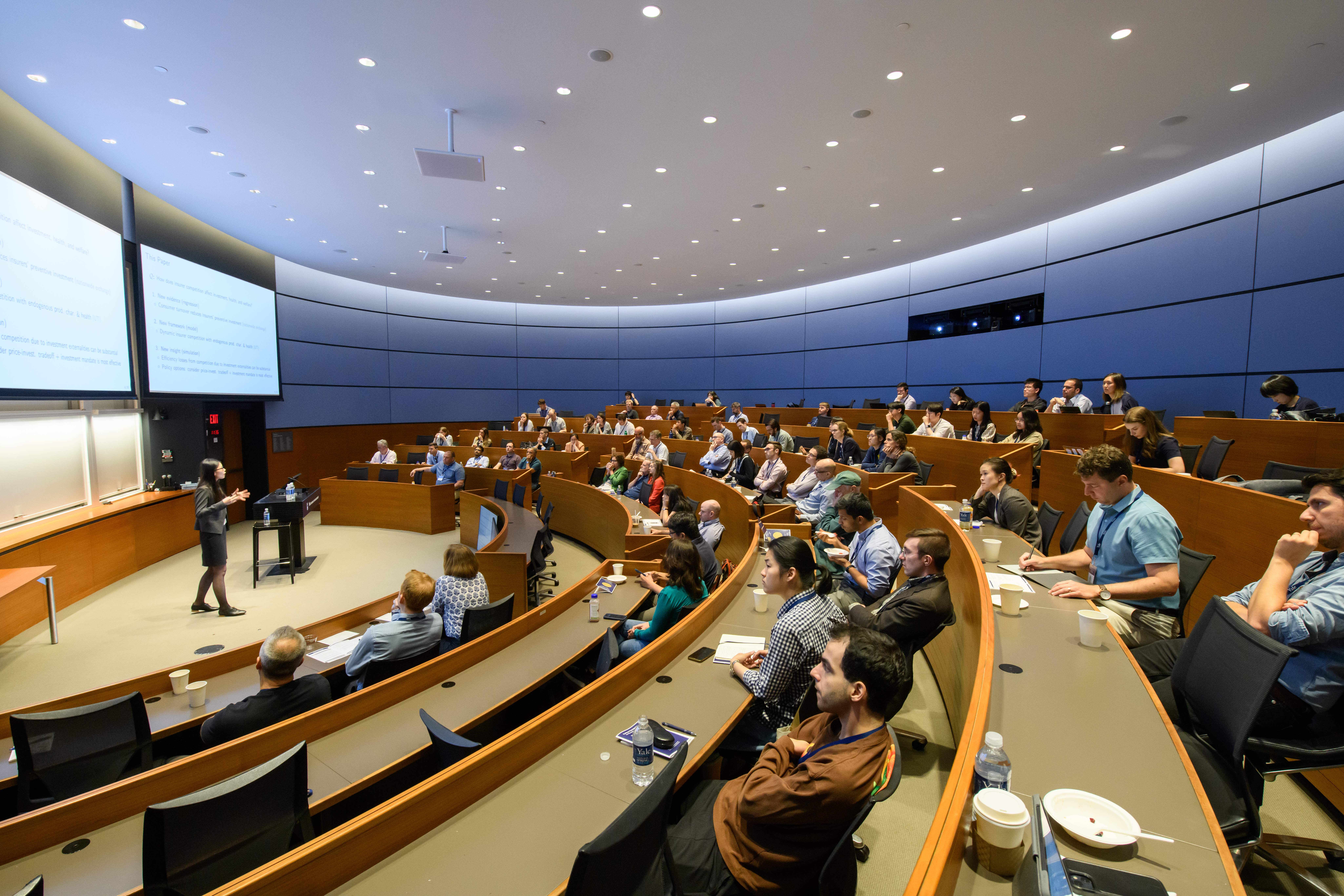
The full conference agenda and list of papers is available here. Learn more about the Cowles Industrial Organization Research Program here.
June 6-7: Conference on Macroeconomics
On the final two days, David Argente (Yale) and Jón Steinsson (University of California, Berkeley) organized the 2024 Macroeconomics Conference, featuring over 50 participants and 8 new papers.
The Macroeconomics Conference was great because it showcased the latest advancements in applied and empirical macroeconomics. This year’s conference featured exciting research on the use of novel datasets, the development of new empirical methods, and their application to a wide range of macroeconomic topics, including growth, firm dynamics, labor economics, climate change, and monetary economics.
— David Argente and Jón Steinsson, organizers
The conference opened with a presentation by David Baqaee (UCLA), ‘Supplier Churn and Growth: A Micro-to-Macro Analysis,’ and then included several papers on innovation and R&D. Maarten De Ridder (London School of Economics) explored product innovation as a key driver of aggregate economic growth, and Karel Mertens (Federal Reserve Bank of Dallas) looked at increases in nondefense R&D appropriations leading to increases in various measures of innovative activity and higher business-sector productivity.
Day two featured presentations on the macroeconomics of climate change, how to identify monetary policy shocks with natural language approaches, and the term structure of inflation expectations.
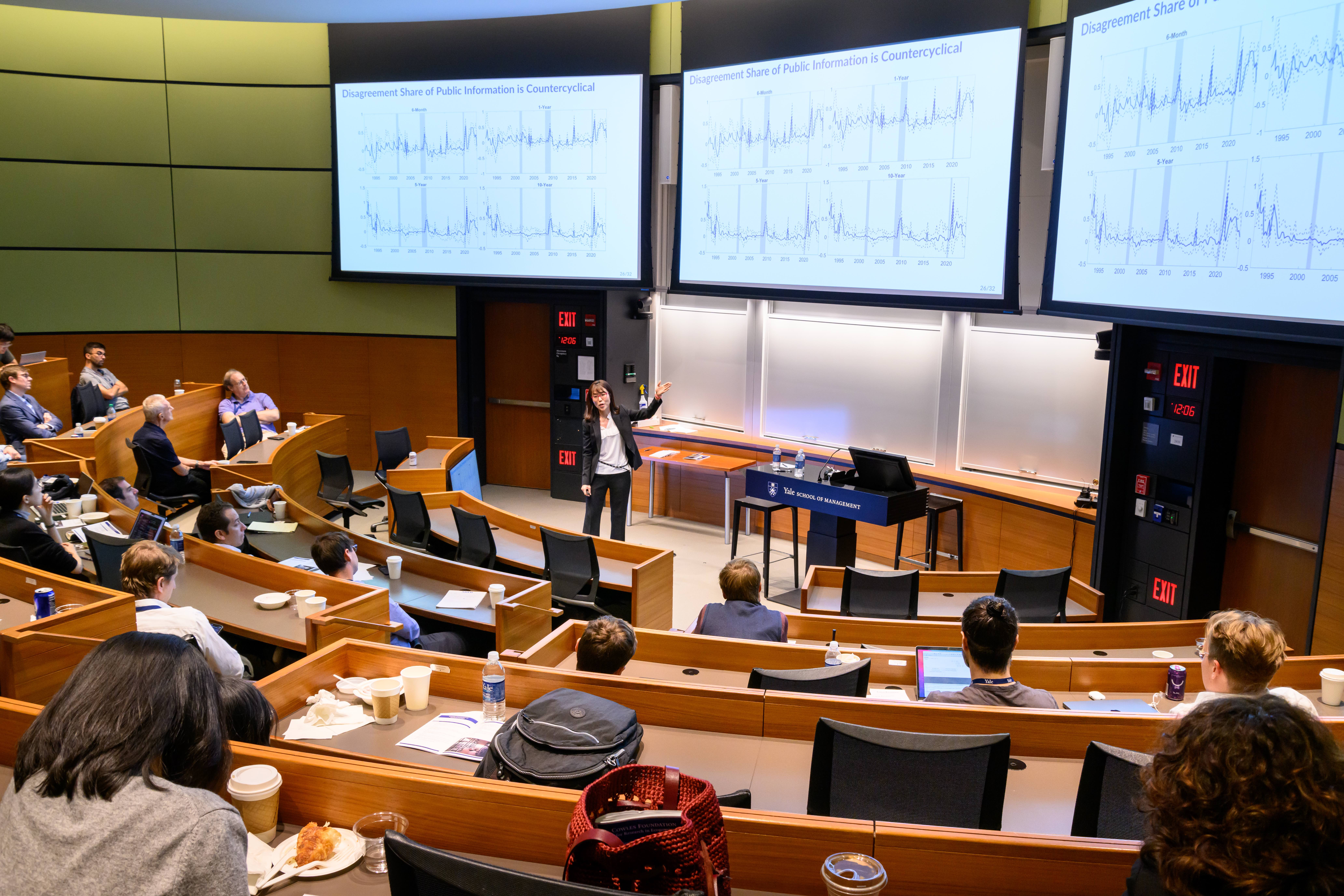
The full conference agenda and list of papers is available here. Learn more about the Cowles Macroeconomics Research Program here.



